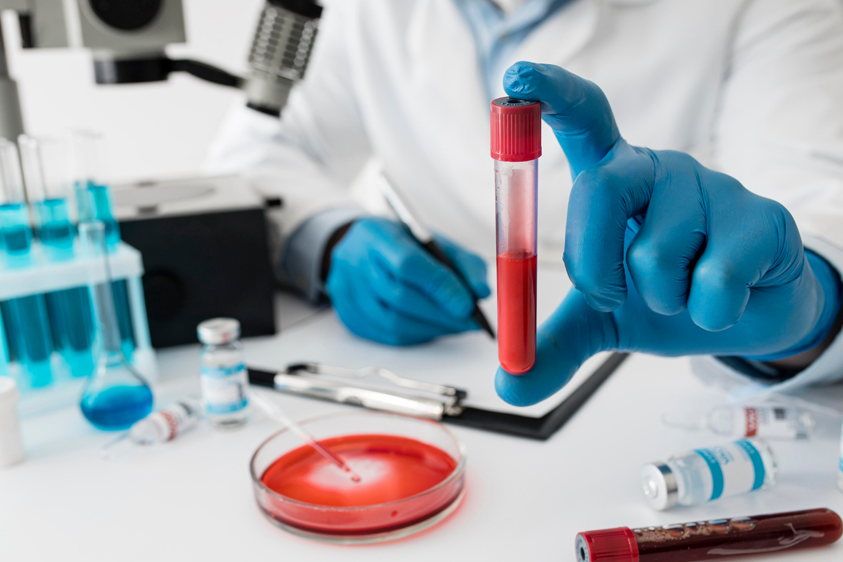
If you need a blood test in Nagpur, you can easily book a home blood collection service. Here’s how:
- Find a Service: Search for a trusted home blood collection service provider in Nagpur. You can check online, use healthcare websites, or ask your doctor for recommendations.
- Contact the Provider: Reach out to them by phone, email, or through their website. Share your name, age, contact details, and home address.
- Request the Test: Let them know which blood test you need and pick a convenient date and time for the collection. If unsure, ask your doctor for advice on the necessary tests.
- Get Confirmation: The provider will confirm your appointment and give you details about the phlebotomist (the person who will collect your blood).
- Prepare for Collection: Be ready on the scheduled day and time. Follow any special instructions, like fasting, as needed for your test.
- Blood Collection: The phlebotomist will come to your home with all the required equipment and collect your blood sample in a safe and hygienic way.
- Receive Results: Your blood sample will be sent to a lab for testing, and the provider will send you the results within the promised time.
This simple process allows you to get your blood test done without leaving your home.
What Safety Precautions Should I Take Before a Home Blood Collection?
Yes, there are a few safety steps to follow before a home blood collection:
- Check the Credentials: Ensure the person collecting your blood is a trained professional, like a phlebotomist or nurse.
- Use Sterile Equipment: Confirm they are using a new, sterile needle and syringe for the procedure.
- Hand Hygiene: Make sure the person collecting your blood is wearing gloves and has sanitized their hands.
- Clean the Area: The spot where your blood will be drawn should be cleaned with antiseptic.
- Share Your Health Info: Inform them if you have any allergies or are taking medications.
- Stay Comfortable: Ensure you’re feeling relaxed and comfortable during the process.
- Proper Disposal: After the collection, ensure the needle and syringe are properly disposed of, and the area is cleaned again with antiseptic.
Following these steps will help ensure a safe and smooth home blood collection. If you have any questions, feel free to ask the healthcare professional assisting you.
which type of pathology test use blood sample ?
Blood tests are essential tools in diagnosing, monitoring, and managing a wide range of medical conditions. Below are the most common types of pathology tests that use blood samples, explained point-by-point:
1. Complete Blood Count (CBC)
- Purpose: A CBC measures different components of blood, including red blood cells, white blood cells, hemoglobin, hematocrit, and platelets.
- Used For: Detecting anemia, infections, inflammation, clotting disorders, and certain cancers like leukemia.
2. Blood Chemistry Tests (Basic Metabolic Panel)
- Purpose: This test measures levels of different chemicals in the blood, such as glucose, calcium, and electrolytes (sodium, potassium, bicarbonate, and chloride).
- Used For: Evaluating kidney function, blood sugar levels, and electrolyte imbalances.
3. Liver Function Tests
- Purpose: These tests measure the levels of enzymes and proteins produced by the liver, including ALT (alanine transaminase), AST (aspartate transaminase), bilirubin, and albumin.
- Used For: Assessing liver health, diagnosing liver disease, and monitoring liver function during treatments.
4. Lipid Profile (Cholesterol Test)
- Purpose: A lipid profile measures cholesterol levels, including LDL (low-density lipoprotein), HDL (high-density lipoprotein), and triglycerides.
- Used For: Assessing the risk of heart disease, stroke, and evaluating the effectiveness of cholesterol-lowering medications.
5. Thyroid Function Tests
- Purpose: These tests measure thyroid hormone levels, primarily TSH (thyroid-stimulating hormone), T3, and T4.
- Used For: Diagnosing thyroid disorders such as hypothyroidism and hyperthyroidism.
6. Blood Glucose Test
- Purpose: Measures blood sugar (glucose) levels.
- Used For: Diagnosing diabetes, prediabetes, and monitoring blood sugar levels in people with diabetes.
7. Hemoglobin A1C Test
- Purpose: This test provides the average blood sugar levels over the past 2-3 months.
- Used For: Managing and diagnosing diabetes.
8. Blood Clotting Tests (Coagulation Tests)
- Purpose: Tests like Prothrombin Time (PT) and Partial Thromboplastin Time (PTT) measure how well your blood clots.
- Used For: Diagnosing bleeding disorders, monitoring blood-thinning medications, and assessing the risk of excessive bleeding during surgeries.
9. Infectious Disease Tests
- Purpose: Blood tests can detect infections caused by bacteria, viruses, or fungi. This includes tests for HIV, hepatitis, syphilis, and more.
- Used For: Diagnosing infectious diseases and determining their severity.
10. Cancer Marker Tests
- Purpose: Some blood tests detect cancer markers, which are substances produced by cancer cells.
- Used For: Monitoring and diagnosing certain types of cancers like prostate cancer (PSA test), ovarian cancer (CA-125), and colon cancer (CEA).
11. Vitamin and Mineral Tests
- Purpose: These tests measure levels of essential vitamins (like Vitamin D and B12) and minerals (such as iron, calcium, and magnesium).
- Used For: Identifying deficiencies that may lead to health issues such as anemia, osteoporosis, and fatigue.
12. Renal Function Tests
- Purpose: These measure waste products in the blood, such as urea and creatinine, to evaluate kidney function.
- Used For: Detecting kidney disease and monitoring patients with chronic kidney issues.
Conclusion
Blood sample-based tests provide a wealth of information about a person’s health. They help in early diagnosis, treatment planning, and disease prevention, making them indispensable tools in modern healthcare.

